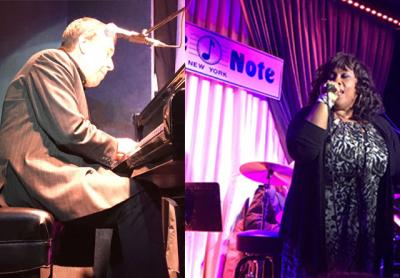Relay: Nighttime Is The Right Time

One cold winter’s night about 26 years ago, two friends and I shivered on West Third Street, craning our necks and peering in the large window of the Blue Note Jazz Club, straining for a glimpse of Ray Charles. We were barely employed musicians then, sharing a small apartment in Hoboken and busking in the subway when times were especially tough (they usually were).
On Saturday, I nodded hello to the shadows of those three poor scruffs as I strode into the club, now flush with 40 dollars and then some, to sit at the bar, sip wine, and listen to Jools Holland bang out rhythm and blues and boogie-woogie on a grand piano.
I’d seen a blurb about Mr. Holland, an original member of the band Squeeze, and his show at the Blue Note, “Piano, Vocals, and Drum Frenzy,” in the “Goings On About Town” section in The New Yorker. Learning that Ruby Turner, a wonderful British-Jamaican singer, would accompany him at the Blue Note, I had to attend.
Squeeze was a marvelous band that crafted superb, Beatles-esque pop in the late 1970s and early ’80s. Since 1992, Julian Miles Holland has hosted “Later . . . With Jools Holland,” a BBC program on which new and established musicians perform and are interviewed by the host, who often joins in.
My introduction to Ms. Turner came on “Small World, Big Band” by Mr. Holland and his Rhythm and Blues Orchestra, a sprawling, 22-track release featuring blues and pop artists including Paul Weller, Stereophonics, Van Morrison, Taj Mahal, and Mark Knopfler. George Harrison’s final performance, completed shortly before his death in 2001, is one standout track. Ms. Turner’s contribution, the elegiac and deeply stirring “Nobody ut You,” is another.
But Saturday: Curse you, Metropolitan Transportation Authority! Fifteen long minutes ticked by before the F train pulled into the station, and by the time I got to the Blue Note, the bar, which accommodates just a dozen stools, was full. But, unlike that frigid night 26-odd years ago, fortune smiled. The nice lady at the door said that if the show wasn’t sold out, I could upgrade to a table seat for an additional 15 dollars. After an hour of lurking uncomfortably behind the bar patrons, I received the welcome news and was led deeper into the venue.
How about this one, she asked, pointing to an empty chair. We can do better, I thought, though by now the joint was jammed.
And then I saw it: amid the dense crowd, an open seat, not three feet from the stage, directly in front of that grand piano’s keyboard! I was the new companion of a family of three, who had flown from Orlando so that the ninth-grade pianist among them could see Mr. Holland. They had apparently been the first arrivals, and I silently thanked them for their enthusiasm, their punctuality, and for not having had a second child.
And then it was show time, and Mr. Holland and the drummer, Gilson Lavis — another Squeeze alumnus, smartly attired in three-piece suit and tie — were fantastic, surely living up to the show’s title with a flurry of rollicking, stomping duets.
On a frantic, boogie-woogie rendition of “Flight of the Bumblebee,” the pianist himself took flight, his left hand pounding an insistent bass as the right danced up and down the keys. Taking an odd, delightful turn, the musicians segued into, and then out of, a most uptempo take on Bach’s Prelude No. 1 in C major as the crowd sat, spellbound.
Finally, the gregarious Mr. Holland announced, “It’s time for our last very special guest of the evening, one of the most famous people in the whole of England.” No, he said, it “isn’t Her Majesty, the Queen.” Making her debut at the Blue Note — “apart from last night and the night before” — was “the living boogie-woogie queen of England.”
Ms. Turner, with her accompanists, brought the house down, belting out “Rock Me,” made famous by Sister Rosetta Tharpe; “To Love a Child,” and, finally, “Peace in the Valley,” the latter two featured on the 2015 album “Jools & Ruby.”
The lights came up, and so did the soundtrack, and the crowd made its way to the door, and as I thought again of those poor scruffs straining for a peek at Ray Charles so many cold winter nights ago, the unmistakable sound of a Wurlitzer electric piano sounded and the late legend’s “What’d I Say” filled the venue:
“Hey mama, don’t you treat me wrong
Come and love your daddy all night long
All right now, hey hey, all right!”
Christopher Walsh is a senior writer at The Star.
